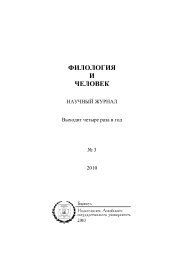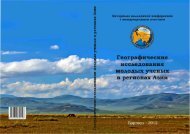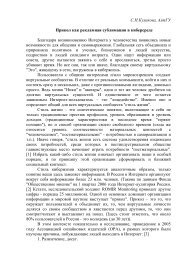Erasmus Mundus Action 1 Compendium 2009 - EACEA - Europa
Erasmus Mundus Action 1 Compendium 2009 - EACEA - Europa
Erasmus Mundus Action 1 Compendium 2009 - EACEA - Europa
Create successful ePaper yourself
Turn your PDF publications into a flip-book with our unique Google optimized e-Paper software.
<strong>Erasmus</strong> <strong>Mundus</strong> Masters Courses<br />
EUMAINE<br />
European Master of Science in Nematology<br />
Duration: 2 years<br />
Course description:<br />
Nematodes are everywhere and play a variety of roles. They are among the most harmful organisms<br />
of crops, especially in the tropics. However, several species are very promising as natural antagonists<br />
and can be used in bio-control programmes against pest insects. Because of their ubiquitous<br />
presence, overwhelming densities and diversity (sometimes compared to insects) the free-living<br />
nematodes are an ideal tool for biodiversity studies as well. Moreover, they are used as bio-indicators<br />
of pollution in both terrestrial and aquatic environments.<br />
The European Master of Science in Nematology (EUMAINE) programme, brings together some of the<br />
European leading universities and research institutes active in Nematology. The objective of the<br />
EUMAINE is to give participants a thorough basis, practical skills and updated knowledge in all<br />
aspects of plant- and insect-parasitic nematodes, as well as free-living aquatic and soil nematodes<br />
and to ensure that the student becomes familiar with current theoretical and applied aspects of<br />
scientific research through direct contact with renowned nematologists and nematological institutes<br />
from different countries. It fulfils the international needs for training highly qualified nematologists with<br />
a multidisciplinary knowledge in the diverse fields of Nematology.<br />
Depending upon the interest and background students can choose between 2 modules: Nematology<br />
applied to agro-ecosystems or Nematology applied to natural ecosystems. During this 2-years Master<br />
programme students will spend the first semester, covering basic Nematology courses in English, at<br />
Ghent University (Belgium) and from the second semester onwards they can select Specialised<br />
Nematology and supporting courses at any of the partner universities : the University of Jaén (Spain),<br />
the University of Ėvora (Portugal), the University of Bielefeld (Germany) or Ghent University (Belgium)<br />
where they will be staying for at least one more semester. Some courses are taught in Spanish,<br />
Portuguese and German.<br />
Because of its multidisciplinary approach the programme prepares the student for a career in very<br />
diverse environments and disciplines. The course is open for candidates having a University BSc<br />
degree in agricultural, biological or environmental sciences with a degree equivalent to first class<br />
honours or second class upper. An international educational committee will select the candidates up to<br />
a maximum of 28 participants per year.<br />
Students who successful finish the programme will be awarded the degree of European Master of<br />
Science in Nematology and will be given a joint degree among the universities involved.<br />
Website: www.eumaine.ugent.be<br />
Partners:<br />
Ghent University, Belgium (Co-ordinating institution)<br />
University of Jaén, Spain<br />
Bielefeld University, Germany<br />
University of Évora, Portugal<br />
Contact:<br />
Maurice Moens<br />
Ghent University<br />
Ledeganckstraat 35<br />
9000 Ghent, BELGIUM<br />
maurice.moens@ugent.be<br />
59






